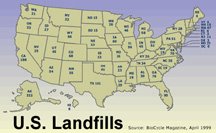Legislators support tougher landfill law
The News & Observer
RALEIGH, NC - Just before midnight Wednesday, the state Senate and then the House tentatively approved more stringent regulation of landfills despite intense lobbying by waste haulers.
"I know there are some companies that do not like this bill," Sen. Charlie Albertson, a Duplin County Democrat, told the Senate. "I know there are many more constituents who love this bill and the protections it provides the community and the environment."
The bill, if it receives final approval today, would add a statewide disposal tax, increase setback requirements to protect streams, require increased financial assurances by companies wanting to build facilities, and require computer manufacturers to recycle the computers sold in the state.
The state Senate voted 28-16 to tentatively approve the bill, while the House vote was 71-44. Both were pushing to adjourn the current legislative session today, after final votes.
While a panel of House and Senate members agreed to the compromise, some House Democrats pressed for changes to reimburse solid waste companies for money spent on plans for landfills that won't be allowed if the legislation passes. The House voted 83-31 for a separate measure to do that, and that will get further debate today.
The overhaul of current laws was spurred by concerns that private regional landfills proposed in rural eastern and Piedmont counties could turn the state into one of the nation's top five importers of garbage and debris. Solid-waste companies are attracted to North Carolina by inexpensive rural land, the absence of a surcharge on garbage and the state's central location on the East Coast.
Facing the specter of a tougher law on landfills, Waste Industries brought out the heavy weaponry for a last-minute PR blitz -- plastic bottles. On them were printed the invitations to a tour Wednesday of the Raleigh-based company's landfill in Sampson County, meant to show that landfills are cleaner than many people think. Waste Industries wants to build North Carolina's largest landfill in Camden County to import waste from eastern states.
Jim Perry, president and chief executive officer of Waste Industries, said the company suffers from a knee-jerk reaction that the state is going to "sink in a sea of imported garbage." He tried to dispel the idea that waste from other states is somehow less desirable.
"There is a perception that North Carolina waste is special trash," he said. "If I put two bags of garbage on the table, one from New York City and one from Apex, can you tell me that one is more toxic than the other? No."
The company used the tour for members of the media to make its case than modern landfills such as the one in Sampson County are more environmentally sound than old-fashioned dumps. Waste Industries buries about 1 million tons a year at the Sampson County landfill near Roseboro. By agreement with the local government, it does not take waste from other states.
But Waste Industries and other solid-waste companies want to build large regional landfills that would bury trash delivered by truck, train and barge from states along the East Coast. The proposed landfill in Camden County would bury up to 3 million tons of trash a year. Regional landfills have also been proposed in Hyde, Columbus and Scotland counties.
Some rural communities want to host large landfills for the money. Sampson County government gets about $1.4 million a year in landfill revenue, said Susan Holder, the assistant county manager. That money has helped pay for ambulances, patrol cars and construction of an Agri-Exposition Center, as well as shaving several pennies off the property tax rate, she said.
Ven Poole, a Waste Industries vice president, said the legislation would not stop the importation of garbage, which is constitutionally protected, or prevent construction of large landfills. He predicted that the six existing privately owned landfills would become larger because the tougher regulations would make it more difficult to locate new landfills.
Among the environmental protections, the bill would increase the required distance between a landfill and a stream from 50 to 200 feet. South Carolina, Maryland, Ohio and Tennessee all require 200-foot setbacks. Virginia, Pennsylvania and New York require 100-foot setbacks.
"We were not offering our citizens the same protections as other states," said Paul Crissman, chief of solid waste for the N.C. Division of Waste Management.
The bill would also prevent construction of a landfill within five miles of a national wildlife refuge, two miles of a state park or one mile of a state gamesland.
That language seems aimed at stopping landfills proposed near Camden. The Black Bear landfill would be near the Great Dismal Swamp National Wildlife Refuge. The Alligator River Recycling landfill, a construction debris landfill, would be near Pocosin Lakes National Wildlife Refuge.
About two dozen members of Friends of Green Swamp, an environmental group based in southeastern North Carolina, walked the halls of the legislature Wednesday, urging lawmakers to pass the bill. The group has been fighting the proposed Riegel Ridge landfill in Columbus County, which would take trash from North and South Carolina.
"We know a community has to have a method of dealing with its waste," said Steve Smith of Whiteville, chairman of the group. "We are just against landfills in a place as ecologically fragile as the Green Swamp. We think it's a fundamentally bad place to have a regional landfill of that capacity."
The bill includes a proposed $2-per-ton tax on trash. Unlike more than 20 other states, North Carolina has no surcharge on garbage. About half the money generated will go to clean up old unlined landfills and a portion will be distributed to cities and counties.
Franklin Freeman, senior aide to Gov. Mike Easley, told a House committee that if the legislation and disposal tax didn't pass, the state would start suing cities and towns to clean up old landfills.

